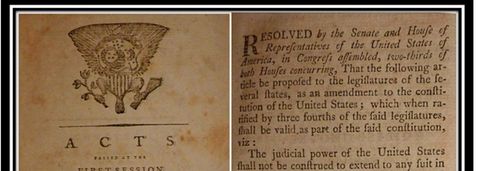PREAMBLE:
THE U.S. CONSTITUTION'S EQUAL PROTECTION CLAUSE IS BASED ON THE ONE PERSON, ONE VOTE MORALITY OF OUR REPRESENTATIVE GOVERNMENT.
STUDENTS APPRECIATE ITS FAIRNESS.
THE ELECTORAL COLLEGE
DISCARDS
ALL PERSONS' VOTES FOR ANY NATIONAL CANDIDATE WHO DOES NOT WIN THEIR STATE.
IT VIOLATES ONE PERSON, ONE VOTE.
IT GRANTS ONE PARTY CONTROL
OF THAT STATE'S POLITICAL FORTUNES. ONLY TOTALITARIAN STATES HAVE ONE PARTY RULE.
STUDENTS KNOW THESE ARE NOT DEMOCRACIES.
THEREFORE THE ELECTORAL COLLEGE CAUSES STUDENTS TO LOSE FAITH IN U.S. DEMOCRACY.
EDUCATORS INCULCATE THE NEXT GENERATION RESPONSIBLE FOR U.S. DEMOCRACY. EDUCATORS CALL FOR THE ABOLITION OF THE ELECTORAL COLLEGE, TO EMPOWER THE NEXT GENERATION TO PROTECT U.S. DEMOCRACY.
The Amendment

SECTION 2: THE ELECTORAL COLLEGE IS PERMANENTLY ABOLISHED. VOTERS IN ALL STATES SHALL VOTE FOR ONE PRESIDENT AND ONE VICE PRESIDENT. ALL VOTES FOR PRESIDENT AND VICE PRESIDENT SHALL BE SECURELY TRANSMITTED TO THE NATIONAL SEAT OF THE UNITED STATES. EACH AND EVERY VOTE SHALL BE IMPARTIALLY COUNTED AT THE NATIONAL SEAT. THE PRESIDENT AND VICE PRESIDENT CANDIDATES WHO HAVE A PLURALITY OF ALL VOTES SHALL BE DETERMINED TO BE THE PRESIDENT AND VICE PRESIDENT.
SECTION 3: NO FEDERAL OR STATE GOVERNMENT SHALL MAKE OR ENFORCE ANY LAW OR PROCEDURE WHICH PREVENTS ANY PERSON FROM MAKING A SECURE VOTE , OR IMPEDES SECURE TRANSMISSION OF VOTES TO THE NATIONAL SEAT, OR IN ANY WAY PROHIBITS THEIR CONTRIBUTION TO THE TOTAL NATIONAL VOTE.
(That means whoever has the most votes wins.)
History
The Electoral College was established in 1788 as an expedient, because prior to telegraph, telephone, railroad, vehicle, airplane, and computer internet, votes were transmitted over wilderness paths, with little security, vulnerable to accidental and deliberate loss and alteration.

Millennials grew up in the most partisan era since the Civil War. They question democracy, because the general public is not extreme. If blue states have 40% Republicans, and red states have 40% Democrats, most young people know members of both parties. Extreme partisanship turns them off, hence the growth of independents. Most independents ally with principles of one of the two parties. But they dislike partisanship, so they decline affiliation.
Voter turnout is dampened by the Electoral College in several ways:
1) Democrats in blue states and Republicans in red states assume their single vote only adds to a margin of victory.
2) Democrats in red states and Republicans in blue states expect their votes to be discarded.
3) The Electoral College fosters partisanship. Political parties like that, perhaps, but most Americans do not.
Canyon Elementary School District |